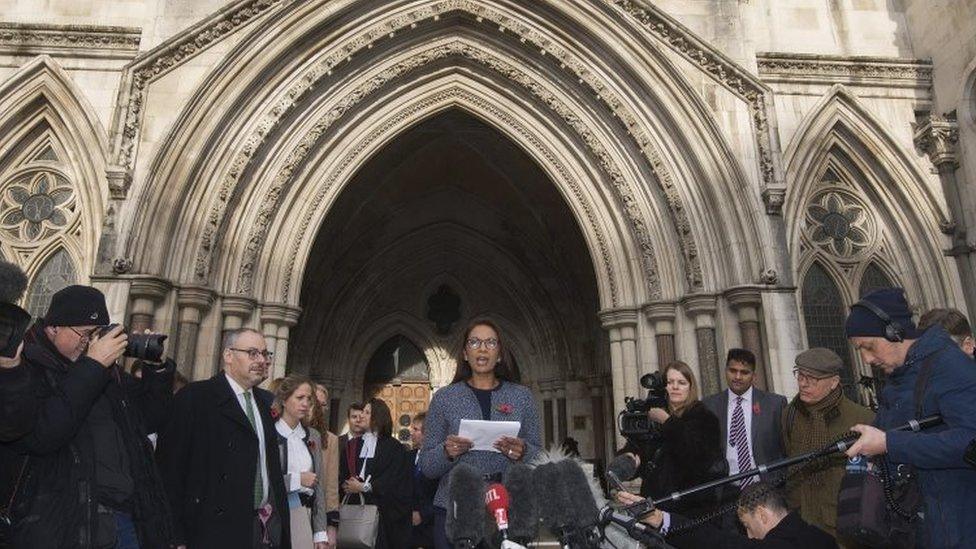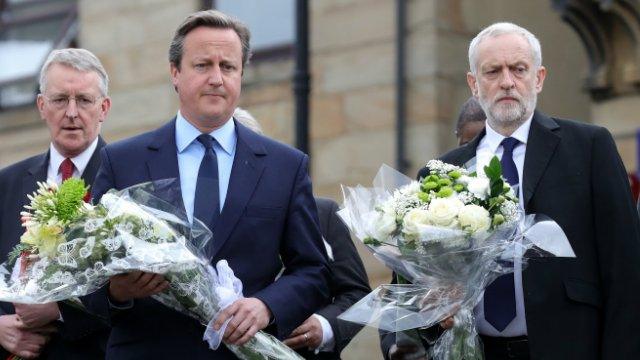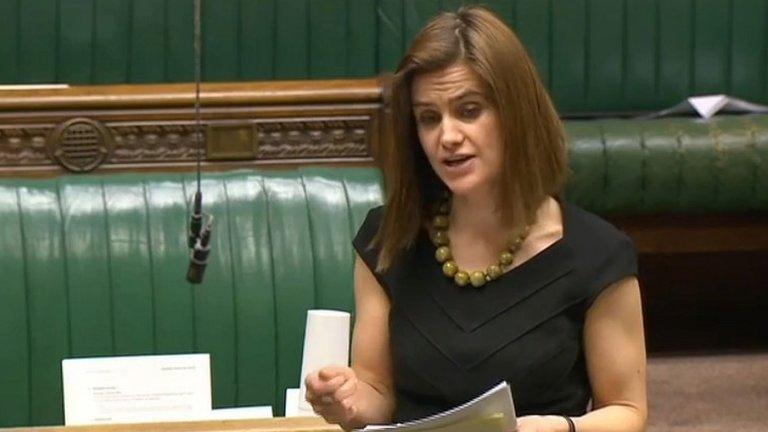Ripples from Article 50 ruling reach Parliament
- Published
- comments

Gina Miller won her case at the High Court, challenging the government's intention to by-pass Parliament over the triggering of Article 50
It was supposed to be a quiet demi-week, leading to a mini-break for half term, but events, dear boy...
Last week MPs were being briefed that there would be no votes at all in the Commons, and there are still none, but the ripples from the High Court ruling to require Parliamentary approval for the start of the Brexit process, the triggering of the fabled Article 50 of the Lisbon Treaty, may draw them in.
The first splashes will come on Monday, with what promises to be a very interesting government statement in response. I'm not sure how much can be said by ministers with a live appeal process under way, but the mood music and the demeanour of the rival camps will be fascinating to behold.
And at some point in the week, another Brexit ripple may manifest in the Chamber, if the government moves fast to trigger the by-election to replace Stephen Phillips. Tory MPs will doubtless be ecstatic to be conscripted to be footsloggers, knocking on doors in the dark, in a by-election campaign in rural Lincolnshire, in January.
Meanwhile, the prospect that there will now have to be some kind of Brexit (Commencement) Bill, would certainly provide opportunities for Remainer mischief, not least because, as a constitutional measure, it would have to be considered in detail by a committee of the whole House, where diehard pro-EU MPs could catch it in a crossfire of hostile amendments and bog it down in the procedural mire.
But do they want to?
Many of the MPs who campaigned for Remain in June now insist that they have accepted the result and have switched their focus to the kind of Brexit the government should strive for. The chair of the new Brexit select committee, Labour's Hilary Benn, tells me on Today in Parliament, on Radio 4 tonight at 11.30pm, that he thinks it would be a mistake to clutter up a measure to trigger Article 50 with all kinds of caveats and conditions.
The real target of the proponents of "soft Brexit", or EU membership lite, is a bill that is yet to come; the promised Great Repeal Bill, which would pave the way for the repeal of the 1972 European Communities Act, external, and that is some way off.
So if the government does lose its Supreme Court appeal, the result might be a short carefully-drafted bill, to be launched into the Commons in January, put through all its formal stages of debate within a couple of weeks and passed through the Lords in good time for the government's self-imposed deadline of triggering Article 50 by March.
While Lib Dem and SNP MPs might well conduct guerrilla operations, there would only be serious trouble if Labour decided to join in.... and with many Labour MPs surveying constituencies which voted emphatically for Leave, that may be problematic.
Nor does it seem likely that the House of Lords would seek to block the measure. To be sure, their lordships are even more pro-EU than MPs, but they have a fine sense of the limits they can push. Here I take as my text a speech made by Baroness Smith of Basildon, Labour's leader in the Upper House, external, on how her party would approach Brexit:
"We will use the expertise and knowledge in this House to fully understand the implications of Brexit, to advise the Government and to do whatever we can to ensure that these issues are effectively addressed, both through our highly regarded EU Committees and on the floor of Your Lordships House. We will scrutinise. We will examine. But my Lords - we will not block. But neither will we be bullied into abdicating our responsibilities. We have to be adult about this. We can't have the most enthusiastic Brexiters crying foul every time Parliament asks for more details or seeks to scrutinise."
Again, the considerable bloc of Lib Dem Lords might attempt a guerrilla campaign, but again they would normally need Labour support to have any real impact. And if Labour stick by Baroness Smith's words, they would need to attract a freelance army of pro-EU Labour peers, plus a fair number of crossbenchers and Conservatives - a tall order.
But all that's for the future; here's my rundown of the week ahead.
Monday
The Commons opens (2.30pm) with Defence questions, after which the government has already announced a statement on the High Court ruling that Parliament has to approve the triggering of the Article 50 process to leave the EU - and this will probably be the major parliamentary event of this truncated week.
There may also be other ministerial statements or urgent questions, before the House moves on to a general debate on Exiting the EU and workers' rights.
The adjournment debate, led by the former Education Secretary Nicky Morgan is on Midland Mainline electrification - a major regional issue. Electrification was promised by the then Transport Secretary, Justine Greening, in 2012, but now there is talk that it may be postponed because of cost over-runs on work elsewhere in the network. Expect a show of strength by MPs with constituencies along the line from London to Sheffield, not least because many in the Eat Midlands believe they will get very little benefit from HS2, which runs through the region, and could end up depending on the last inter-city line not to have electrification.
And continuing the railway theme, my committee pick (from a rather thin field, be it admitted) is the Transport Committee hearing (4.05pm) on rail franchising, where the star witness is Rail Minister Paul Maynard, who is due on at 4.55pm, unless he is delayed by late running.
In the Lords (2.30pm), what looks likely to be a very quick rubber stamping committee stage for the Labour peer Baroness Young of Hornsey's Modern Slavery (Transparency in Supply Chains) Bill, external tops the agenda. Her bill would ban public contracting authorities from using an economic operator that has no produced a slavery and human trafficking statement.
Then peers turn to their second committee stage day on the Wales Bill, external - last week I flagged that three Welsh Labour heavyweights, former Welsh secretaries Peter Hain and Paul Murphy, plus their former leader, Neil Kinnock wanted to delete the clause that would amend the Wales Act 2014 to remove the requirement for there to be a referendum in advance of the devolution of a portion of income tax.
In other words, they think there should be a referendum before any income tax powers are devolved - unusually, they plan to hold a vote on that amendment.
The Lords didn't get that far down the agenda, because other business intruded - and I'm not sure it will come up this time, with debate likely to focus on the "reservations" - policy areas that would be retained at Westminster.
Tuesday
The Commons opens (11.30am) with Business, Energy and Industrial Strategy questions. Expect plenty of probing around the Nissan deal. That's followed (unless a statement or urgent question intrudes) by a Ten Minute Rule Bill from Labour's Adrian Bailey. His Small and Medium Sized Co-operative Development Bill calls for small but important changes to reduce the burden of audit requirements on small co-ops, and bring them into line with those for other kinds of company.
The day's main debates are on subjects chosen by the Backbench Business Committee - on the role of grammar and faith schools and on raising awareness of a new generation of veteran and service personnel.
In Westminster Hall (9.30am-11am) there's a debate on disability hate crime - where the key focus will be on whether the prosecuting authorities take it seriously enough. The responsible minister is the Solicitor-General, Robert Buckland, and his Labour shadow is Nick Thomas Symonds - the two have been sparring partners since they began their careers at neighbouring Cardiff legal practices.
Mr Buckland says the issue has been a priority and that prosecution numbers are starting to creep up, albeit from a very low base. The debate will also focus on sentencing levels for these offences and whether they are adequate, and may also move onto disability "mate" crime, where individuals "befriend" people with a disability and then steal from them or abuse them.
Another one to watch is Anna Turley's debate (4.30pm-5.30pm) on sentencing for animal cruelty, an issue she has been pursuing since a particularly distressing case in her constituency; she has a private members bill on the issue, due for debate in February.
On the committee corridor the Education Committee has a promising-looking hearing, (9.45am) reviewing the evidence base allowing new grammar schools and extending selective education. The Department for Education, academics and policy experts will weigh in, with Minister for School Standards, Nick Gibb, and Dr Tim Leunig, Chief Scientific Adviser for the Department for Education responding.
The Culture Media and Sport Committee (10.30am) has a hearing on homophobia in sport - with John Amaechi, the first NBA basketball star to come out as gay, Olympian race-walker Tom Bosworth; international rugby union referee Nigel Owens (via video link, at 11.30am) and footballer Lianne Sanderson (via video link, at noon).
In the Lords, there are a couple of interesting points to watch out for in the second report stage day on the Children and Social Work Bill, external, where Labour look set to force a vote to prevent local authorities being able to opt out of children's social care legislation to 'test' new ways of working or to privatise key services; the government may face yet another defeat.
The second issue is on the safeguarding of unaccompanied refugee children where the minister, Edward Timpson, has offered a package of 'safeguarding' measures to prevent Labour Peer Lord Dubs from inflicting a further defeat.
The dinner break business is a Lib Dem regret motion against a statutory instrument on the benefit cap for housing benefit and Universal Credit.
Wednesday
The Commons is in recess - but the Lords plough on.
The subjects at question time range across problems faced by carers in accessing primary and community support services, controlling Japanese knotweed and placing children in local authority care close to their extended family and current school.
The day's main business is further committee stage debate on the Policing and Crime Bill, external - the debates will cover clauses on licensing and gambling, anti-doping, alcohol limits, posthumous pardons, pre-charge anonymity and the Victims Code.
During the lunch break, there will be a short debate on the report of the Parliamentary and Health Ombudsman on unsafe discharge from hospital.
- Published17 June 2016

- Published17 June 2016
